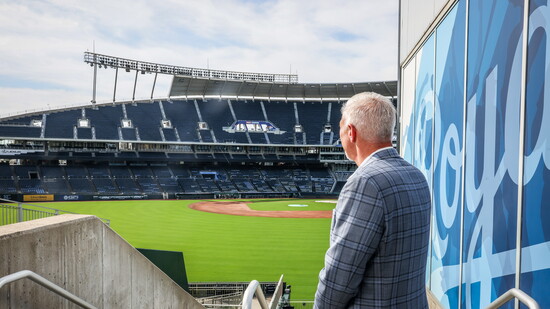If you ask Joel Goldberg when he “made it” in sports broadcasting, he doesn’t point to the glitter of a Super Bowl press box or the roar of a World Series crowd. Those moments came—Super Bowl XXXIV in New Orleans in 2000, Fenway Park during the 2004 Fall Classic—but the true arrival didn’t happen under the stadium lights. It happened later, in Kansas City, when he realized for the first time in his career that he was right where he wanted to be.
That sense of contentment wasn’t won easily. Goldberg’s path into broadcasting wasn’t paved with connections or shortcuts. He broke in the old-fashioned way, knocking on doors, cold calling executives, sending out demo tapes, and weathering rejection after rejection. “It was never handed to me,” he admits. Instead, he built it the same way he builds interviews, with persistence, preparation, and a knack for finding the story no one else was telling.
His storytelling roots were planted in small markets, where the spotlight rarely shines. Rhinelander, Wisconsin, was first, where high school and community features dominated his workload. In Madison, he added college sports to the mix, sharpening his instincts. St. Louis opened the door to the big leagues: the NFL, NHL, and Major League Baseball. By the time Kansas City called, Goldberg was battle-tested and ready.
“At each stop, I learned that everyone has a story to tell,” he says. “The under-the-radar or less famous ones are often the most meaningful.”
One of those lessons came courtesy of Albert Pujols. Goldberg was there when the slugger broke into the majors in 2001, but it took eight years to earn his trust. The breakthrough, when it finally came, reshaped Goldberg’s approach. “The biggest names crave normalcy,” he says. “They just want to be treated like regular people.” That perspective has guided his interviews ever since, whether he’s talking to a Hall of Famer, a rookie, or a CEO.
For Kansas City fans, Goldberg is more than a broadcaster; he’s part of the fabric of the Royals experience. His voice has carried fans through both heartbreak and triumph, from the long rebuilding years to the electric 2014–2015 championship run. While many point to the 2014 Wild Card game as a franchise-defining moment, Goldberg’s personal favorite came days earlier in Chicago, when Salvador Perez squeezed the final out that clinched the team’s first playoff berth in 29 years.
“That celebration was unforgettable,” he recalls. “It felt surreal that one of the losingest franchises in baseball had finally ended such a long drought.”
Kansas City, he says, brings a different flavor to baseball fandom. “There’s a Midwest kindness here that extends to the ballpark,” he explains. “Fans take pride not just in the team, but in the city and the people who represent it. That loyalty shows players they’re embraced as part of the community, no matter the record.”
For Goldberg, the real magic is in the quieter moments. “Interviewing a player after his big league debut never gets old,” he says. He recalls Nate Eaton in Toronto, hearing only his mom’s voice in the stands as he circled the bases, or Samad Taylor hitting a walk-off in his first game at Kauffman and telling him, ‘This is something you don’t even dream of.’ “I held back some tears hearing their raw emotions and was honored to be a part of their journeys.”
He’s quick to note what makes an interview truly great: humility, honesty, perspective, and passion. “The best interviews come from people unafraid to be themselves,” he says. ”That kind of openness goes a long way with fans and their teammates.”
Among the thousands of stories he’s told, one stands above the rest. In 2011, Goldberg hosted a 30-minute tribute to Royals legend and former broadcast partner Paul Splittorff following his passing. “It was both incredibly challenging and profoundly meaningful,” he says. “He mattered as much to us in the booth as he did to the fans.”
While broadcasting remains his anchor, Goldberg’s work has expanded far beyond the ballpark. After the Royals’ 2015 World Series championship, he began connecting the lessons of winning teams to the business world, launching his Game Changer Speaking Series. The parallels, he explains, are undeniable.
“Championship culture isn’t just about pulling the rope the same way,” Goldberg says. “It’s about trust. When trust is built and sustained day after day, it creates an environment people genuinely want to be part of.”
His speaking events often pull back the curtain on the unseen teamwork that powers a broadcast. “Showing that behind-the-scenes teamwork highlights how every role is essential to success,” he says. “People begin to see how their own role matters, while others recognize the value of the roles around them. That shift in perspective can change the way a team looks at its culture.”
After 30 years, what keeps him excited? For Goldberg, it’s the unpredictability of the game. “Who else gets to go to a job where you truly never know what’s going to happen day to day?” he says. “Win or lose, I’ve got a job to do and someone’s watching somewhere at home, in a hospital bed, on a military base overseas and beyond.”
For Kansas City, Joel Goldberg isn’t just the man on the screen after the final out. He’s a storyteller who’s built a career on trust, a voice that’s carried a city through heartbreak and triumph, and a guide reminding us that, whether in baseball or business, culture is the true game changer.
To learn more about Joel and the Game Changer Speaker Series, visit www.joelgoldbergmedia.com.
